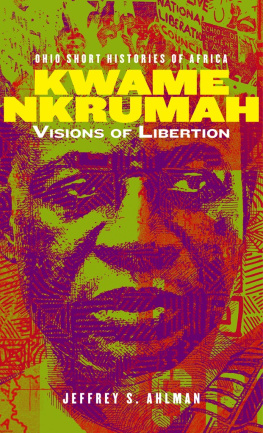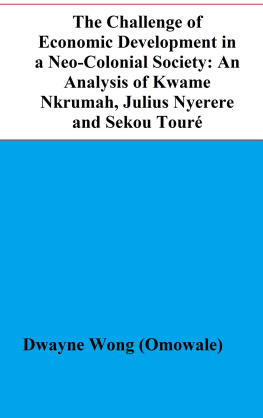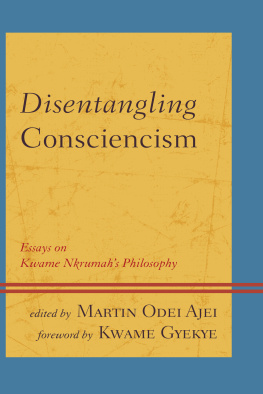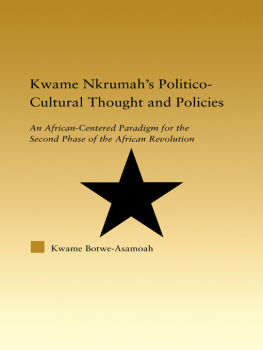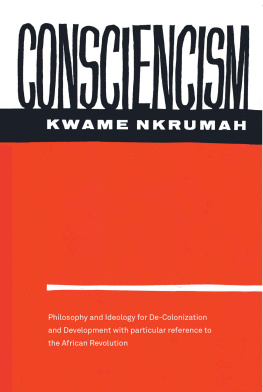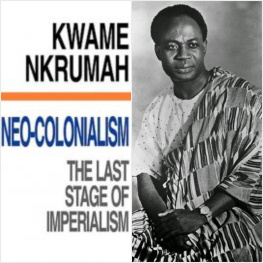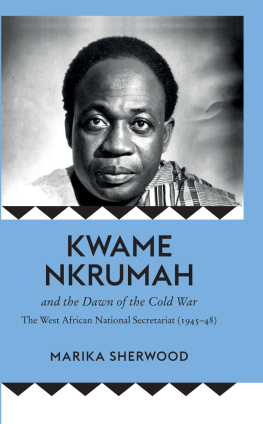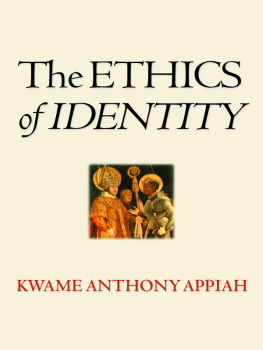Kwame Nkrumah
OHIO SHORT HISTORIES OF AFRICA
This series of Ohio Short Histories of Africa is meant for those who are looking for a brief but lively introduction to a wide range of topics in African history, politics, and biography, written by some of the leading experts in their fields.
Steve Biko
by Lindy Wilson
Spear of the Nation (Umkhonto we-Sizwe): South Africas Liberation Army, 1960s1990s
by Janet Cherry
Epidemics: The Story of South Africas Five Most Lethal Human Diseases
by Howard Phillips
South Africas Struggle for Human Rights
by Saul Dubow
San Rock Art
by J.D. Lewis-Williams
Ingrid Jonker: Poet under Apartheid
by Louise Viljoen
The ANC Youth League
by Clive Glaser
Govan Mbeki
by Colin Bundy
The Idea of the ANC
by Anthony Butler
Emperor Haile Selassie
by Bereket Habte Selassie
Thomas Sankara: An African Revolutionary
by Ernest Harsch
Patrice Lumumba
by Georges Nzongola-Ntalaja
Short-changed? South Africa since Apartheid
by Colin Bundy
The ANC Womens League: Sex, Gender and Politics
by Shireen Hassim
The Soweto Uprising
by Noor Nieftagodien
Frantz Fanon: Toward a Revolutionary Humanism
by Christopher J. Lee
Ellen Johnson Sirleaf
by Pamela Scully
Ken Saro-Wiwa
by Roy Doron and Toyin Falola
South Sudan: A New History for a New Nation
by Douglas H. Johnson
Julius Nyerere
by Paul Bjerk
Thabo Mbeki
by Adekeye Adebajo
Robert Mugabe
by Sue Onslow and Martin Plaut
Albert Luthuli
by Robert Trent Vinson
Boko Haram
by Brandon Kendhammer and Carmen McCain
A Short History of Chinua Achebes Things Fall Apart
by Terri Ochiagha
Amlcar Cabral
by Peter Karibe Mendy
Wangari Maathai
by Tabitha Kanogo
Josie Mpama/Palmer: Get Up and Get Moving
by Robert R. Edgar
Female Monarchs and Merchant Queens in Africa
by Nwando Achebe
Chris Hani
by Hugh MacMillan
Kwame Nkrumah
by Jeffrey Ahlman
Kwame Nkrumah
Visions of Liberation
Jeffrey S. Ahlman
OHIO UNIVERSITY PRESS
ATHENS
Ohio University Press, Athens, Ohio 45701
ohioswallow.com
2021 by Ohio University Press
All rights reserved
To obtain permission to quote, reprint, or otherwise reproduce or distribute material from Ohio University Press publications, please contact our rights and permissions department at (740) 593-1154 or (740) 593-4536 (fax).
Printed in the United States of America
Ohio University Press books are printed on acid-free paper
31 30 29 28 27 26 25 24 23 22 21 5 4 3 2 1
Library of Congress Cataloging-in-Publication Data
Names: Ahlman, Jeffrey S., 1982 author.
Title: Kwame Nkrumah : visions of liberation / Jeffrey S. Ahlman.
Other titles: Ohio short histories of Africa.
Description: Athens : Ohio University Press, 2021. | Series: Ohio short histories of Africa | Includes bibliographical references and index.
Identifiers: LCCN 2020048193 (print) | LCCN 2020048194 (ebook) | ISBN 9780821424520 (paperback) | ISBN 9780821447390 (pdf)
Subjects: LCSH: Nkrumah, Kwame, 19091972. | PresidentsGhanaBiography. | Pan-AfricanismHistory20th century. | GhanaPolitics and government19571979.
Classification: LCC DT512.3.N57 A66 2021 (print) | LCC DT512.3.N57 (ebook) | DDC 966.7051092dc23
LC record available at https://lccn.loc.gov/2020048193
LC ebook record available at https://lccn.loc.gov/2020048194
Contents
Acknowledgments
In 2017, following the launch of my first book on Nkrumah-era Ghana, Living with Nkrumahism: Nation, State, and Pan-Africanism in Ghana, Gillian Berchowitz asked me if I would be interested in writing a biography of Kwame Nkrumah for the Ohio Short Histories of Africa series. I initially wavered. Approximately six months later, she contacted me again about writing the biography. It was through her persistence and foresight that this project came about. Following Gills retirement, Ricky Huard, Stephanie Williams, and Sally Welch, among many others at Ohio University Press, helped shepherd the project to completion in the midst of a global pandemic. I cannot thank them enough for their patience and assistance.
The project is based upon approximately seventeen years of research on Nkrumah-era Ghana. My debts in Ghana, the United States, and beyond are too many to list in these short acknowledgments. However, they include those who talked to me about their experiences in 1950s and 1960s Ghana; archivists, teachers, and friends who introduced me to new archival collections and lines of thought; colleagues who have read numerous drafts of articles, chapters, and other materials on Nkrumah and life in midcentury Ghana; institutions that funded my research, most recently including the National Endowment for the Humanities and Smith College; my family who endured writing times; and students who have helped me think more deeply about decolonization, pan-Africanism, and the politics of both hope and disappointment that surround any discussion of Nkrumah and Africas path to independence. This book could not have been written without you all.
Abbreviations
| AAPC | All-African Peoples Conference |
| ADM | Administrative Files |
| BAA | Bureau of African Affairs |
| CIAS | Conference of Independent African States |
| CPP | Convention Peoples Party |
| CYO | Committee on Youth Organisations |
| GCR | Gold Coast Regiment |
| GPRL | George Padmore Research Library on African Affairs |
| IAFE | International African Friends of Ethiopia |
| MP | Member of Parliament |
| NCBWA | National Congress of British West Africa |
| NLC | National Liberation Council |
| PAF | Pan-African Federation |
| PRAAD | Public Records and Archives Administration Department |
| RG | Record Group |
| RLAA | Research Library on African Affairs |
| UGCC | United Gold Coast Convention |
| UNIA | Universal Negro Improvement Association |
| UP | United Party |
| VRP | Volta River Project |
| WASU | West African Student Union |
| WANS | West African National Secretariat |
Kwame Nkrumah
A Transnational Life
Few individuals exemplify the richness and depth of the world that shaped twentieth-century Africa more than Kwame Nkrumah. At its foundation, Nkrumahs biography necessarily subverts both the intentional and unintentional constraints of what have emerged in both popular and scholarly works as two-dimensional representations of the African past. Like many of his generation, Nkrumah lived a life that spanned multiple historical and historiographical worlds. As a child and young man, Nkrumah came of age in the emerging imperial world of the early Gold Coast (colonial Ghana). Attending a Catholic primary school in the far southwestern Gold Coast town of Half Assini before gaining admission into one of the first matriculating classes at the new Achimota Secondary School just outside the Gold Coast capital of Accra, Nkrumahs early years were fundamentally marked by both the visible and the invisible changes ushered into Gold Coast life by the onset of formal colonial rule. After Achimota, Nkrumahthrough the help of the Nigerian nationalist and Accra-based newspaper editor Nnamdi Azikiwetraveled to the United States to attend Lincoln University, a historically Black college in rural Pennsylvania. Spending approximately a decade in the United States, Nkrumah witnessed American life at the height of the Great Depression and the Second World War. Even more importantly, he confronted life and politics as a Black man in Jim Crowera America.

